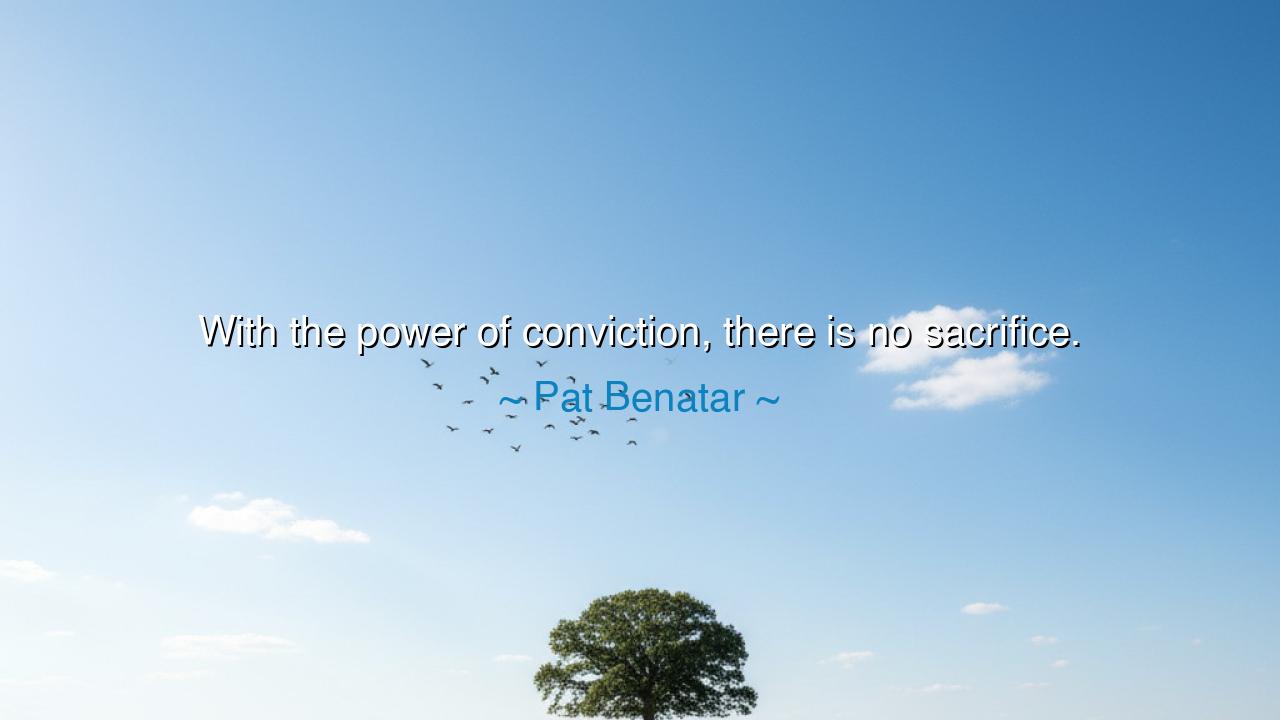
With the power of conviction, there is no sacrifice.






Hearken, O children of the ages, to the resounding words of Pat Benatar, who illuminates the transcendent force of conviction. She teaches that when the heart and mind are united in unshakable belief, the trials and costs that might otherwise seem burdensome dissolve. With the power of conviction, there is no sacrifice, for the soul embraces purpose with such clarity that effort and hardship become instruments of fulfillment rather than burdens to endure.
Benatar reminds us that true conviction transforms the nature of struggle. When one acts in alignment with deepest values and unwavering belief, what appears as loss or trial to the unsteady becomes merely the path of destiny to the resolute. The sacrifices of lesser hearts are transfigured into the milestones of the steadfast, and the soul’s journey is illuminated by the certainty of purpose.
Consider the life of Joan of Arc, whose conviction in divine guidance enabled her to face armies, courts, and execution with unflinching courage. Though her trials were immense, she felt no sacrifice, for every step she took was aligned with the truth she believed. Her unyielding faith transformed danger into mission, suffering into meaning, and mortality itself into a testament of the power of conviction.
Even in the humble spheres of life, this principle holds. The artisan who labors to create beauty, the activist who champions justice, and the teacher who molds minds all encounter obstacles. Yet when guided by firm belief, the weight of these challenges is lifted, for conviction aligns intention with action, making every exertion a celebration of purpose rather than a burden of sacrifice.
O children of the future, carry this teaching in your hearts: cultivate the power of conviction, let it anchor your actions, and allow it to transform trials into triumphs. When the soul acts with clarity, resolve, and faith in its purpose, no endeavor is too arduous, no path too perilous, for sacrifice ceases to exist in the face of unwavering belief.
If you desire, I can also craft a visual, ancient scroll-style presentation of this passage to capture the heroic, timeless, and deeply evocative essence of Benatar’s teaching on conviction, courage, and the transformation of hardship into purpose.






LLihff
This perspective suggests that conviction can act as a shield against the sense of loss, but it makes me question how realistic this is in practice. Are there examples where people’s firm beliefs genuinely protected them from feeling they had sacrificed something, or is sacrifice always part of making meaningful choices? How does this idea intersect with leadership, activism, or artistic pursuits where the stakes are often high and losses tangible?
LDLe Duy
I find this quote empowering, yet it also sparks curiosity about the limits of conviction. Does it truly erase the experience of sacrifice, or does it simply transform the emotional experience into one of purpose and meaning? How do people cultivate such unwavering conviction, and is it something innate, learned, or a combination of both? I also wonder about the social and ethical dimensions of pursuing personal beliefs without compromise.
SVson vu
Reading this quote makes me reflect on personal experiences where strong conviction seemed to make difficult choices feel manageable. But I question whether this applies universally. Are there situations where conviction cannot fully mitigate the real costs of action? How do we distinguish between genuine conviction and stubbornness, where the latter might cause unnecessary sacrifices despite a firm belief in one’s stance?
TNTraam Ngoc
This statement raises questions about the relationship between commitment and resilience. Can conviction genuinely prevent the sense of sacrifice, or is it that it provides a framework to endure hardship with purpose? I also wonder if conviction alone is sufficient—does it require alignment with values and preparation, or can mere belief be enough to navigate difficult choices without regret or loss?
PNPhan NgocLiinh
Benatar’s quote is thought-provoking because it reframes the idea of sacrifice. It makes me wonder whether conviction truly eliminates the feeling of sacrifice, or if it simply changes our perception of it. Does holding firm to one’s beliefs make challenges feel less like loss and more like a necessary step toward fulfillment? How does this apply in real life, where decisions often require giving up comfort, security, or approval from others?